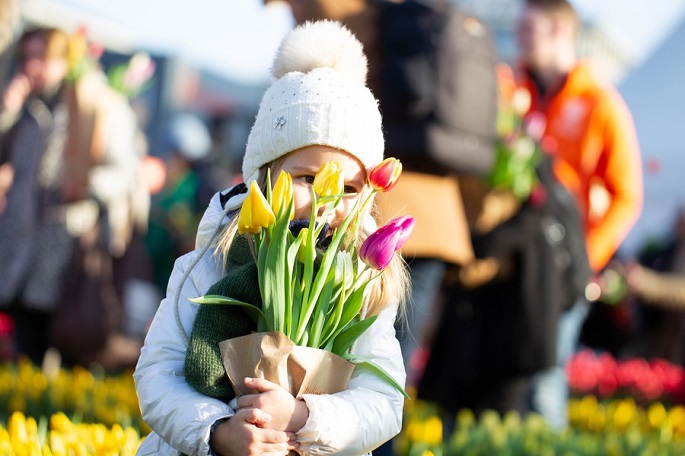Inside a Dutch tulip farm, from greenhouse to global market
Published : 06 May 2023, 23:04
Tulip farms in the Netherlands, are active all year round, exporting some 90 percent of their cut flowers and bulbs. The country, also known as the Land of Tulips, is the world's largest exporter of tulips, reported Xinhua.
Smit Flowers, a family business that has been cultivating tulips since the late 1980s, is one such farm.
Arjan Smit, the third-generation manager of the company based in Spierdijk, a town in the province of North Holland, still remembers the time when his farm produced its first batch of 100,000 tulips during a cultivation season of some three months.
"Now we have 150,000 tulips per day," Arjan told Xinhua. Currently, his modern company has two full-time employees and more than a dozen flexible workers. It owns 40 hectares of tulip fields and a greenhouse of about one hectare, focusing on producing tulip bulbs and fresh cut flowers.
Inside the huge greenhouse, tulip plants grow densely, with some just showing their sprouts and others about to bloom.
A large, automated equipment was running smoothly, delivering budding white tulips to a conveyor belt on one end. After a series of automated processes, such as sorting, debulbing, leaf removing, cleaning and bundling, neatly packaged tulips appeared on the other end of the conveyor belt waiting to be boxed and transported.
Smit explained that, thanks to smart technologies and advanced equipment, 80 percent of the tulip cultivation process on his farm is automated.
The fully automated and smart greenhouse control system monitors most of the production processes from germination, blooming to harvesting, and the operations are controlled by computers.
The greenhouse uses soilless hydroponic cultivation methods, with water collected from the roof. The rainwater is filtered, sterilized by ultraviolet and ozone, and then mixed with nutrients to ensure the healthy growth of tulips. After picking, the remaining water is also filtered and sterilized for recycling.
His farm specializes in producing about 35 tulip varieties that are popular in the market and can also customize the production of different varieties and colors of tulips tailored to customers' needs.
Most of the packaged cut flowers are sent to the Royal FloraHolland flower auction in Aalsmeer for sale, while the rest are sold directly to customers.
"Germany is our biggest market, followed by the United Kingdom and the United States," Smit told Xinhua.
One of the world's largest flower trading markets, Royal FloraHolland is an important link in the Dutch flower industry chain. It serves as a bridge connecting Dutch tulip farmers with flower wholesalers and retailers around the world.
It can help farmers complete a series of complex processes, such as packaging, quarantine, logistics and settlement of flower products, allowing farmers to focus on cultivation, Smit explained.
Although relatively a small share in comparison, tulip exports from his farm to China are steadily increasing every year, Smit said. He is very optimistic about the potential of the Chinese market and looks forward to connecting with more Chinese customers.


